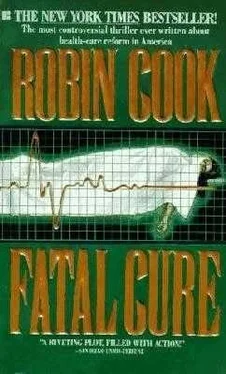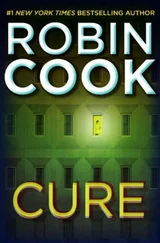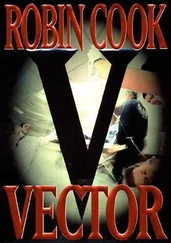David was on his bike by five-thirty and at the hospital before six. En route, he made a mental note to arrange for someone to fix the bay window.
Several of David's patients were still asleep and David didn't disturb them. He went over their charts, planning to see them later. When he peeked into Donald's room he found the man was wide awake.
"I feel terrible," Donald said. "I haven't slept all night."
"What's the problem?" David asked, feeling his pulse quicken.
To David's dismay, the complaints were disturbingly familiar: crampy abdominal pain along with nausea and diarrhea. In addition, just like Jonathan, he complained of having to swallow continually.
David tried to remain calm. He spoke with Donald for almost half an hour, asking detailed questions about each complaint and ascertaining the sequence in which the complaints had appeared.
Although Donald's complaints certainly reminded him of his other deceased patients, there was an aspect of Donald's history that was different: Donald had never had chemotherapy.
Donald had been initially diagnosed as having pancreatic cancer, but surgery had proved this not to be the case. He'd undergone a massive operation called a Whipple procedure which included the removal of his pancreas, parts of his stomach and intestines, and a good deal of lymphatic tissue. When pathology examined the tumor it had been determined to be benign.
Since he had had such extensive surgery on his digestive system, but had not had chemotherapy to compromise his immune system, David was hopeful that Donald's complaints were purely functional and not harbingers of whatever afflicted David's other unlucky patients.
After finishing his rounds, David called admitting to find out Caroline's room number. On his way he had to pass the ICU. Steeling himself against what he might learn, he went in to check on Jonathan Eakins.
"Jonathan Eakins died about three this morning," the busy head nurse said. "It was a very quick downhill course. Nothing we did seemed to help. It was a shame. A young man like that. It proves you never know when you're going to have to go."
David swallowed hard. He nodded, turned, and left the unit. Even though he'd known in his heart that Jonathan would die, the reality of it was hard to take. David still had a hard time absorbing the staggering fact: he had now lost four patients in a little over a week.
On a brighter note, David discovered that Caroline had responded well to her treatment of IV antibiotics and intensive respiratory therapy. Her fever was gone, her color was pink, and her blue eyes sparkled. She smiled broadly the instant David appeared.
"Nikki wants to come to visit you," David said.
"Cool," Caroline said. "When?"
"Probably this afternoon," David said.
"Could you please ask her to bring me my reading book and my spelling book," Caroline said.
David promised he would.
The first thing David did when he got to his office was call home. Nikki answered. David told her that Caroline was much better and that Nikki could visit her that day. He also relayed Caroline's request for her books. Then David asked Nikki to put her mother on the line.
"She's in the shower," Nikki said. "Should she call you back?"
"No, it's not necessary," David said. "But I want you to remind her of something. She brought a gun home yesterday. It's a shotgun, and it is leaning against the newel post at the bottom of the stairs. She's supposed to show it to you and warn you not to touch it. Will you remind her to do all that?"
"Yes, Dad," Nikki said.
David could picture his daughter rolling her eyes.
"I'm serious," he said. "Don't forget."
Hanging up the phone, David wondered about the gun. He didn't like it. Yet he wasn't about to force the issue at the moment. More than anything, he wanted Angela to give up her obsession with Hodges' murder. A brick through the front window was all the warning David needed.
David decided to take this early-morning opportunity to get through some of the never-ending reams of paperwork he was forced to process in connection with his practice. As he laid the first form on his desk, the phone rang. The caller was a patient named Sandra Hascher. She was a young woman with a history of melanoma that had spread to regional lymph nodes.
"I didn't expect to get you directly," Sandra said.
"I'm the only one here just now," David explained.
Sandra told him she'd been having trouble with an abscessed tooth. The tooth had been pulled, but the infection was worse. "I'm sorry to bother you with this," she continued, "but my temperature is one hundred and three. I would have gone to the emergency room, but the last time I took my son there I had to pay for it myself. CMV refused."
"I've heard the story before," David said. "Why don't you come right over. I'll see you immediately."
"Thanks, I'll be right there," Sandra said.
The abscess was impressive. The whole side of Sandra's face was distorted by the swelling. In addition, the lymph nodes beneath her jaw were almost golf-ball size. David checked her temperature. It was indeed one hundred and three.
"You've got to come into the hospital," David said.
"I can't," Sandra said. "I've got so much to do. And my ten-year-old is home with the chicken pox."
"You'll just have to make arrangements," David said. "There's no way I'm going to let you walk around with this time bomb."
David carefully explained the anatomy of the region to Sandra, emphasizing how close the infection was to her brain. "If the infection gets into your nervous system, we're in deep trouble," David said. "You need continuous antibiotics. This is no joke."
"All right," Sandra said. "You have me convinced."
David called admitting to warn them Sandra would be coming. Then he gave her a written set of orders and sent her on her way.
Angela felt terrible. She was exhausted. Several cups of coffee had not been enough to revive her. It had been almost three o'clock before she'd fallen asleep, and once she had, she'd not slept soundly. She'd had nightmares again, featuring Hodges' body, the ski-masked rapist, and the brick through the window.
When she finally did wake up she was surprised to discover that David had already left for work.
As Angela dressed, she regretted her promise to David to try to forget about Hodges. She didn't see how she could "just let Hodges go" as David suggested.
Angela wondered again about Phil Calhoun. She still had not heard a word from him. She figured that the least he could do was check in. Even if he hadn't discovered something significant, he could at least let her know what he'd accomplished to date.
Angela decided to give Phil Calhoun a call, but all she got was his answering machine. Deciding against leaving a message, she simply hung up.
Downstairs, Angela found Nikki in the family room busily reading from one of her schoolbooks.
"Okay," Angela said. "Upstairs for postural drainage."
"I already did it with Dad," Nikki said.
"Really?" Angela said. "How about breakfast?"
"We had that too," Nikki said.
"What time did you two get up?" Angela asked.
"Around four," Nikki said.
Angela wasn't happy about David's getting up so early. Having trouble sleeping was often a sign of depression. She also didn't like the idea of having Nikki up so early.
"How did Daddy seem this morning?" Angela asked as she joined Nikki in the family room.
"Fine," Nikki said. "He called while you were in the shower. He said that Caroline was okay and that I can visit her this afternoon."
"That's wonderful news," Angela said.
"He also asked me to remind you about a gun," Nikki said. "He acted weird, like I wouldn't know what a gun is."
"He's worried," Angela said. "It's no joke. Guns are bad business when it comes to kids. A lot of kids are killed each year because of family-owned guns. But more often than not those cases involve handguns."
Читать дальше












